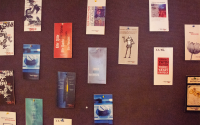John HenleyFriday September 12 2008
Each had a job to do, and each did it to perfection. The four key witnesses chosen by Greenpeace to speak in its defence at the Kingsnorth trial were crucial to the environmental group's acquittal. They were chosen not only to "push all the right buttons" with the court, but to answer the very specific questions the judge would ask the jury to answer, says Ben Stewart, Greenpeace's communications director and a defendant in the case. "We wanted a not guilty verdict, but we also wanted to put the government's policy on coal in the dock."
To convince the jury (and stay out of jail), says Stewart, the activists needed to show Kingsnorth posed "a real and immediate danger to property around the world, and that our actions were proportionate and reasonable to prevent that". The witnesses' task was to hammer home the truth of that claim.
James (aka Jim) Hansen was the authoritative voice required to put Greenpeace's protest into its global scientific context. Possibly the world's leading climate scientist, Hansen is director of Nasa's Goddard Institute for Space Studies and Al Gore's science adviser on global warming. He is something of a green superhero, in effect introducing the world to the concept of climate change.
Among the key points Hansen made to the court were that the proportion of CO2 in the atmosphere has already passed a safe maximum and will have to be rolled back; that this cannot be achieved unless all coal-fired power stations without carbon capture are decommissioned pronto; and that if we carry on as we are sea levels will rise at least 2m this century and 1m species will be pushed into extinction (including 400 by Kingsnorth alone).
"The simple but shocking truth is we have gone too far," he said. "We place our planetary system, inhabitants and future generations in grave peril ... It's up to those of us alive today to take the bold steps needed. There's just barely still time."
Dr Geoff Meaden's job was to put the wind up the court from a regional perspective. Something of a local boy (he's principal lecturer in the Department of Geographical and Life Sciences at Canterbury University), he gave evidence via videolink from Brazil. Nor can his warning that there could be no summer ice left in the Arctic within five years, that Kingsnorth power station itself would be "extremely vulnerable" to flooding through climate change, and that things were "so urgent that unless we act immediately to rapidly reduce greenhouse gas emissions, by the next century we may have to abandon up to 20% of Kent to the sea."
While all the scientific evidence pointed to the fact that we were approaching a tipping point in climate change, the most urgent tipping point was "a change in human behaviours and actions", Meaden said. "It is overwhelmingly perceived," he added, "by the defendants, the scientific community and myself" that climate change is caused by humans.
Aqqaluk Lynge, a former minister in Greenland's home rule government and a vice-president of the Inuit Circumpolar Conference, a human rights organisation representing some 160,000 Inuit living in the Arctic regions, furnished a vivid first-hand account of what global warming will do, and is actually doing.
He's a star witness for the environmental movement on the effects of global warming and it's not hard to see why: against the scientists' charts and figures, Lynge's evidence is undeniably graphic. Plus he usually wears a sealskin waistcoat, which looks pretty cool when everyone else is in a grey suit.
"Climate change affects my community, the Inuit people, by affecting their environment," Lynge told this week's trial in a videolink from Greenland. "We see it in the kind and numbers of species that they hunt, the house and camp constructions that they have to build on melting and unpredictable soils, the unpredictable weather ... the sliding of houses into the sea ... the reduction of habitats for polar bears and other species, and the introduction of new pest species."
Lynge first appeared in the UK in July last year, when he wowed a public inquiry into the proposed expansion of Stansted airport. The Inuit are "the canary in the global coal mine", he said. Some villages have already lost homes, and thinning ice makes hunting harder. "We don't hunt for sport," he said. "You go to the supermarket. We go hunting on sea ice."
Zac Goldsmith is a former editor of the Ecologist magazine and the Conservative party's current parliamentary candidate for the constituency of Richmond Park in west London. His task was to place the activists' actions in a clear political context, which he did by declaring from the outset that there was a "staggering mismatch between what we've heard from government and what we've seen from government in terms of policy". Despite all the Labour government's rhetoric, he stressed, emissions have risen since 1997 and continue to rise. Coal is the "defining challenge": 10 of Europe's 30 most polluting coal-fired power plants are in Britain, and building new ones will "make it very much harder" to convince the likes of China and India to cut back on fossil fuel use. Goldsmith accused the government of a "profound lack of imagination" when it came to examining alternative energy solutions.






